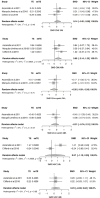Post-competition recovery strategies in elite male soccer players. Effects on performance: A systematic review and meta-analysis
- PMID: 33007044
- PMCID: PMC7531804
- DOI: 10.1371/journal.pone.0240135
Post-competition recovery strategies in elite male soccer players. Effects on performance: A systematic review and meta-analysis
Abstract
Aims: The main aim of the present review was to update the available evidence on the value interest of post-competition recovery strategies in male professional or semi-professional soccer players to determine its effect on post-game performance outcomes, physiological markers, and wellness indicators.
Methods: A structured search was carried out following the PRISMA guidelines using six online databases: Pubmed, Scopus, SPORTDiscus, Web of Science, CINAHL and Cochrane Central Register of Controlled Trials. The risk of bias was completed following the Cochrane Collaboration Guidelines. Meta-analyses of randomized controlled trials were conducted to determine the between and within-group effects of different recovery strategies on performance, physiological markers and wellness data. Final meta-analyses were performed using the random-effects model and pooled standardized mean differences (SMD).
Results: Five randomized controlled trials that used Compression Garments (n = 3), Cold Water Immersion (n = 1), and acute Sleep Hygiene Strategy (n = 1) were included. Greater CMJ values at 48h for the intervention group (SMD = 0.70; 95% CI 0.14 to 1.25; p = 0.001; I2 = 10.4%) were found. For the 20-m sprint and MVC, the results showed no difference either at 24h or 48h. For physiological markers (CK and CRP) and wellness data (DOMS), small to large SMD were present in favor of the intervention group both at 24h (-0.12 to -1.86) and 48h (-0.21 to -0.85). No heterogeneity was present, except for MVC at 24h (I2 = 90.4%; p = 0.0012) and CALF DOMS at 48h (I2 = 93.7%; p = 0.013).
Conclusion: The use of recovery strategies offers significant positive effects only in jumping performance (CMJ), with no effects on the 20-m sprint or MVC. Also, the use of recovery strategies offers greater positive effects on muscle damage (physiological markers and wellness data), highlighting the importance of post-match recovery strategies in soccer.
Conflict of interest statement
The authors have declared that no competing interests exist.
Figures




References
-
- Halson S. Recovery techniques for athletes. Aspetar Sport Med J. 2015;4: 12–16.
-
- Dupuy O, Douzi W, Theurot D, Bosquet L, Dugué B. An evidence-based approach for choosing post-exercise recovery techniques to reduce markers of muscle damage, {Soreness}, fatigue, and inflammation: {A} systematic review with meta-analysis. Front Physiol. 2018;9: 403 10.3389/fphys.2018.00403 - DOI - PMC - PubMed
Publication types
MeSH terms
LinkOut - more resources
Full Text Sources
Research Materials
Miscellaneous

